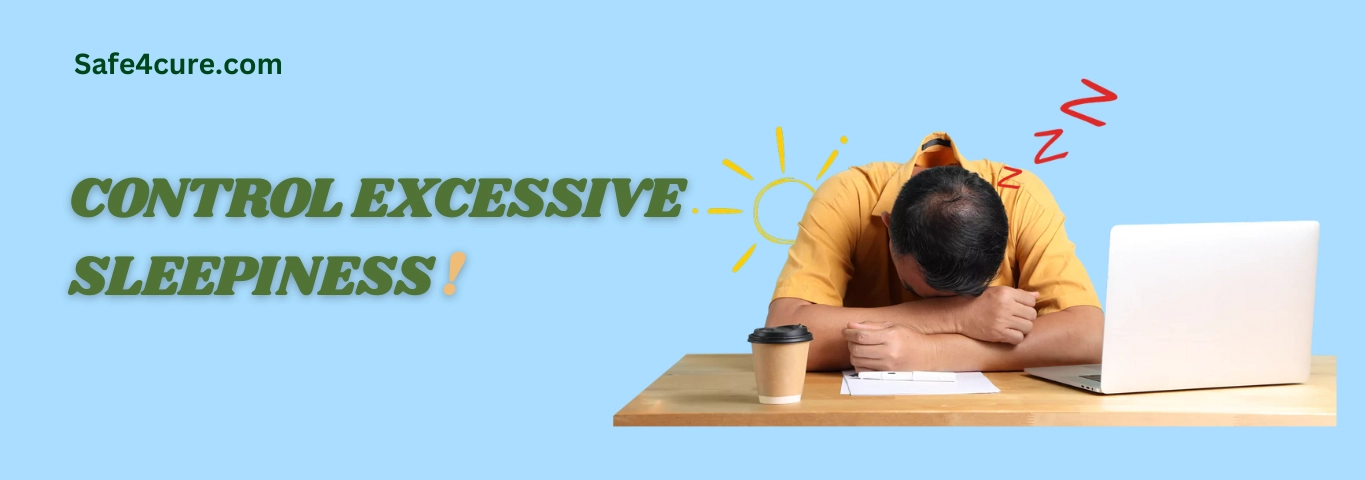Excessive daytime sleepiness (EDS) is a condition characterized by persistent drowsiness during waking hours, often leading to decreased productivity, impaired cognitive function, and increased risks of accidents. Whether caused by sleep disorders like narcolepsy or sleep apnea, lifestyle factors, or underlying medical conditions, managing EDS is crucial for maintaining a healthy and active life.
One of the most effective pharmaceutical treatments for excessive daytime sleepiness is Modafinil. This wakefulness-promoting agent has gained popularity for its ability to enhance alertness and cognitive function without the jittery effects of traditional stimulants like caffeine or amphetamines.
What is Excessive Daytime Sleepiness?
Excessive daytime sleepiness is more than just feeling tired; it is a chronic condition that disrupts normal life. People suffering from EDS find it difficult to stay awake, even in stimulating environments. They may experience frequent yawning, difficulty concentrating, slow reaction times, and unintended naps.
Common Causes of Excessive Daytime Sleepiness
- Sleep Disorders – Conditions like narcolepsy, sleep apnea, and restless leg syndrome can cause fragmented sleep, leading to daytime fatigue.
- Poor Sleep Hygiene – Inconsistent sleep schedules, exposure to blue light before bed, and caffeine or alcohol consumption can affect sleep quality.
- Medical Conditions – Chronic illnesses such as diabetes, depression, and hypothyroidism are often linked to excessive sleepiness.
- Medications – Certain medications, including antihistamines, antidepressants, and muscle relaxants, can induce drowsiness as a side effect.
- Lifestyle Factors – High-stress levels, lack of exercise, and unhealthy eating habits may contribute to poor sleep and daytime sleepiness.
Effects of Excessive Daytime Sleepiness
EDS is not just about feeling sleepy; it can significantly impact various aspects of life:
- Reduced Work and Academic Performance – Lack of alertness can hinder productivity and learning abilities.
- Increased Risk of Accidents – Drowsy driving and workplace accidents are major concerns for individuals with untreated EDS.
- Mental Health Issues – Chronic fatigue is often linked to anxiety, depression, and mood swings.
- Weakened Immune System – Poor sleep quality can make individuals more prone to illnesses and infections.
What is Modafinil?
Modafinil is a prescription medication approved by the FDA for the treatment of sleep disorders such as narcolepsy, obstructive sleep apnea (OSA), and shift work sleep disorder (SWSD). It is classified as a eugeroic, meaning it promotes wakefulness without causing the hyperactivity and dependency commonly associated with stimulants.
How Does Modafinil Work?
Unlike caffeine, which blocks adenosine receptors to prevent drowsiness, Modafinil works by altering neurotransmitters in the brain. It affects the levels of dopamine, histamine, norepinephrine, and orexin, which are responsible for maintaining alertness and focus.
This unique mechanism makes Modafinil a preferred treatment for individuals suffering from excessive daytime sleepiness as it enhances cognitive function without the “crash” effect.
Benefits of Modafinil for Excessive Daytime Sleepiness
- Promotes Wakefulness – Helps users stay alert and awake for extended periods without feeling fatigued.
- Enhances Cognitive Function – Improves focus, memory retention, and decision-making skills.
- Reduces Mental Fatigue – Allows individuals to perform daily activities with greater efficiency.
- Non-Addictive Properties – Unlike traditional stimulants, Modafinil has a lower risk of dependence.
- Long-Lasting Effects – A single dose can last up to 12-15 hours, making it ideal for individuals with demanding schedules.
Who Can Benefit from Modafinil?
Modafinil is widely used by students, professionals, and shift workers who need to remain productive and alert. It is also prescribed for individuals with:
- Narcolepsy – To reduce sudden sleep attacks.
- Obstructive Sleep Apnea (OSA) – Helps improve daytime wakefulness when used alongside CPAP therapy.
- Shift Work Sleep Disorder (SWSD) – Ideal for night shift workers struggling with irregular sleep patterns.
Dosage and Administration
- The standard Modafinil dosage is 100mg to 200mg per day.
- It is recommended to take it in the morning for narcolepsy and sleep apnea or one hour before work for shift work sleep disorder.
- Avoid taking Modafinil late in the day, as it can interfere with nighttime sleep.
Possible Side Effects of Modafinil
Although Modafinil is generally well-tolerated, some users may experience mild side effects, including:
- Headache
- Nausea
- Dry mouth
- Insomnia (if taken too late in the day)
- Increased heart rate
Severe side effects like allergic reactions or skin rashes are rare but require immediate medical attention.
Precautions and Considerations
- Not suitable for individuals with heart conditions or high blood pressure.
- Consult a doctor before using Modafinil if pregnant or breastfeeding.
- Avoid alcohol while taking Modafinil, as it can intensify side effects.
- May interact with certain medications, including birth control pills and blood thinners.
Lifestyle Changes to Complement Modafinil Treatment
While Modafinil is highly effective, incorporating healthy lifestyle changes can enhance its benefits:
- Maintain a Regular Sleep Schedule – Go to bed and wake up at the same time daily.
- Improve Sleep Hygiene – Limit screen time before bed, keep your room dark, and avoid heavy meals late at night.
- Exercise Regularly – Physical activity improves sleep quality and boosts energy levels.
- Healthy Diet – Avoid excessive caffeine and processed foods; opt for a balanced diet rich in vitamins and minerals.
- Stay Hydrated – Dehydration can contribute to fatigue; drink plenty of water throughout the day.
Conclusion
Excessive daytime sleepiness can severely impact daily life, productivity, and overall well-being. Modafinil has proven to be an effective treatment for conditions like narcolepsy, obstructive sleep apnea, and shift work sleep disorder. By promoting wakefulness and enhancing cognitive function, it allows individuals to regain control over their energy levels and mental clarity.
However, for long-term success, combining Modafinil with healthy lifestyle habits, proper sleep hygiene, and medical guidance is essential. If you struggle with chronic daytime sleepiness, consult a healthcare professional to determine whether Modafinil is the right solution for you.
Frequently Asked Questions (FAQs)
1. How long does Modafinil take to work?
Modafinil starts working within 30-60 minutes of ingestion, with peak effects occurring at 2-4 hours.
2. Can Modafinil be used daily?
Yes, but it should only be used under a doctor’s supervision to prevent potential tolerance or dependency.
3. Does Modafinil help with focus and concentration?
Yes, Modafinil is known for enhancing cognitive abilities, making it popular among students and professionals.
4. Can I drink coffee while taking Modafinil?
It’s best to limit caffeine intake as both substances can increase heart rate and cause restlessness.
5. Where can I buy Modafinil?
Modafinil is available with a prescription from licensed pharmacies. Always ensure you purchase from a reputable source.
By understanding the causes of EDS and leveraging the benefits of Modafinil, you can take proactive steps toward a more alert, productive, and fulfilling life.





